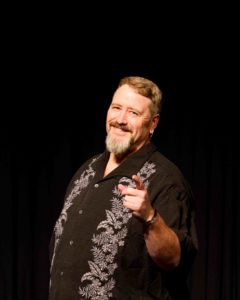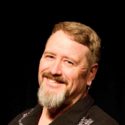What is it about the blues that you love?
I love that the music is all about the feeling and emotion. It’s built on a simple accessible framework that makes the music accessible and immediate. It’s also not important that you play well. Many great blues acts are not great musicians but they absolutely have the feel and the emotional connection. Of course, playing well doesn’t hurt.
What in your experience are the biggest misconceptions people have about earning a living from being a musician?
I think the biggest misconception is the “made it” myth. The reality in today’s music business is the new “made it” is just continuing to be able to have a job. There is no big “discovery” moment anymore, it’s a series of small discoveries and one-at-a-time marketing now. Your career is made on multiple small streams of income. CD sales, merchandise, touring income, workshops are just a few of mine. I’ve been blessed to make a good living the past 8 years from music alone.
How did your previous experience as guitarist help or hinder learning the ukulele?
It was useful in that the basic shapes and tuning are soooo related. But it took me a while to play a uke like a uke. (do I even do this now? Not sure.) Also, the fact that I knew a little about stringed instruments and scales has helped a ton with playing skills.
What’s the best advice anyone gave to you as a musician and who gave it to you?
The best advice I ever got was from my grandfather. He was a piano player in the depression years here in Canada. And he told me that being a musician is a lousy living but a great life. And he was absolutely correct. He also added that when you become a musician you take a vow of poverty and the better you stick to that vow the more you’ll enjoy the life. What I took from that is that you have to make peace with the idea that you can’t do everything. You can’t own the latest gadgets. Good things come but they come from planning and hard work.
If you could play with any musician on planet Earth that you have not yet played with, who would it be and why?
It would be my grandfather. He wasn’t famous or even influential really but by the time I came along he had quit playing publicly and by the time I could really play he was close to the end of his life. I often think how lovely it would have been to be a professional player with him and play shows together.
You are known for touring Canada, Europe and Australia. Do you have any favourite festivals that you look forward to playing and why those ones specifically?
Honestly, I love them all. They all have their special flavour and things that they do well and things they sometimes don’t do well. The bottom line for me is interaction with the fans. I am really into just hanging out with the people. I’ve never wanted to be the big “star” who hides away and then makes a grand entrance. I prefer hanging out in the pub or at the coffee shop with the folks that make it possible for me to have a living.
What are the most common issues students struggle with learning the uke and what advice would you give to someone starting out?
The most common thing I run into is the notion that playing all the songs in your songbook constitutes practice. While this is technically true, all you are practising is your repertoire. You aren’t learning anything new or building new skills. I run into tons of players who think they’re intermediate because they have been playing for several months but all they’ve done is play the same 6 or 8 chords over and over again with the same rhythm. I always suggest that students spend 15 to 20 minutes a day on pure skills development. Work on a hard strum pattern. Play the chords of a key you don’t know. Work on the chords up the neck. Learn a scale. Then after that, you can move onto practising your repertoire.
If you could go back in time 20 years and give yourself one piece of useful advice, what would it be?
The only advice I could offer my early self would be to stay positive and open to possibilities. I’ve been playing uke for over 20 years and for the first 10 I never took it that seriously. I was certain that the guitar was going to be my ticket to “making it”. In the end, it is the ukulele that has carried me around the world. I often wonder how far I could have gotten if I had spent more time with it at the beginning. That said we are where we are meant to be. So maybe I wouldn’t have even made it here. It’s hard to say I suppose and I’m just thrilled to be here.
Check Hal’s site HERE

